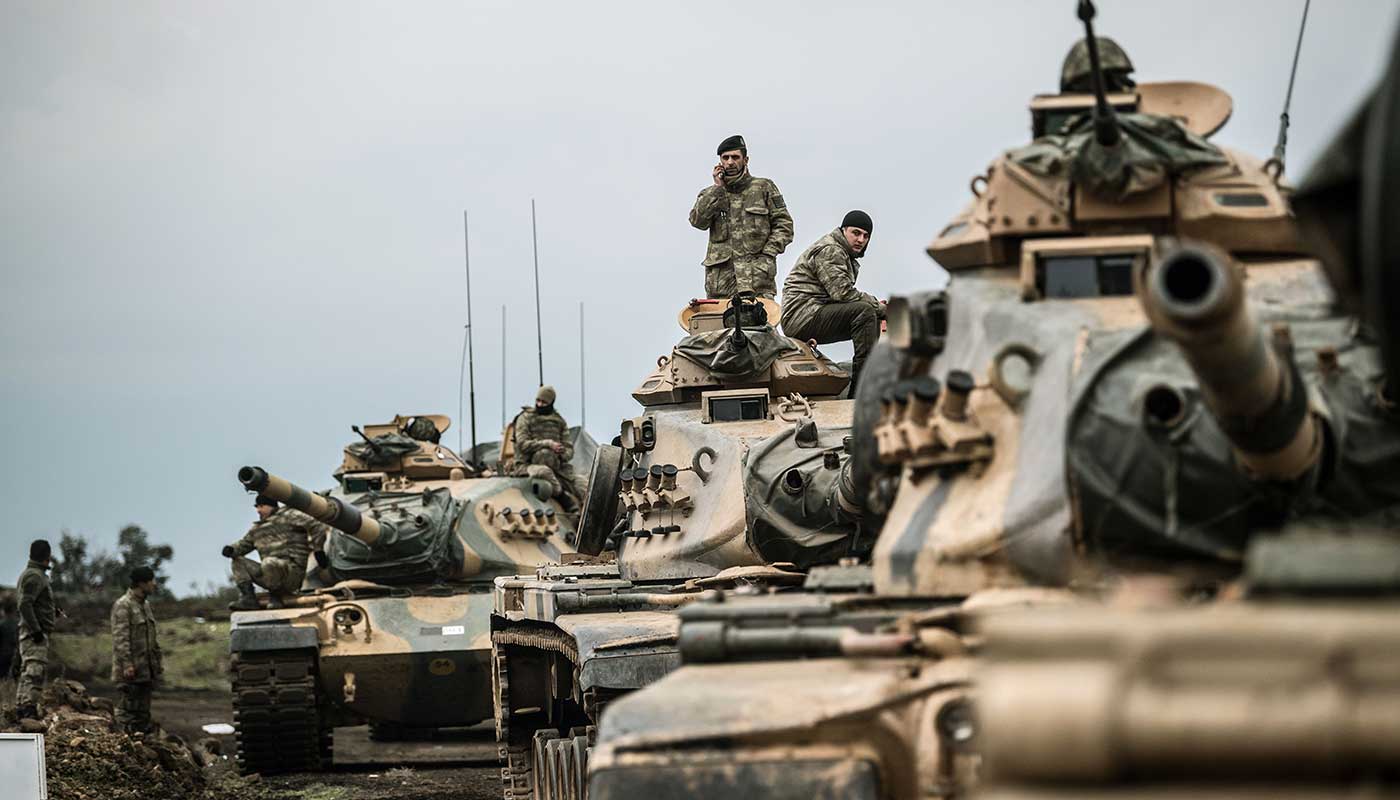Turkish ground troops enter northern Syria
Incursion follows air strikes to remove Kurdish fighters from Afrin

A free daily email with the biggest news stories of the day – and the best features from TheWeek.com
You are now subscribed
Your newsletter sign-up was successful
Turkish ground troops and pro-Turkish rebels from the Free Syrian Army have crossed into northern Syria to clear Kurdish militia from the Syrian province of Afrin.
Turkey says the YPG militia, which forms part of the US-backed alliance battling Islamic State in the region, is aligned with the banned Kurdish Workers Party (PKK).
The troop movement followed dozens of Turkish air strikes on Saturday. The operation, named “Olive Branch”, was reportedly fast-tracked after the US announced plans to help Kurdish and ethnic Arab militias to build a new “border security force” between Syria and Turkey.
The Week
Escape your echo chamber. Get the facts behind the news, plus analysis from multiple perspectives.

Sign up for The Week's Free Newsletters
From our morning news briefing to a weekly Good News Newsletter, get the best of The Week delivered directly to your inbox.
From our morning news briefing to a weekly Good News Newsletter, get the best of The Week delivered directly to your inbox.
Turkey reportedly informed the US in advance of the air strikes, which have so far claimed the lives of at least 17 civilians and three YPG fighters, the UK-based Syrian Observatory for Human Rights told the BBC.
“Our jets took off and started bombing and now the ground operation is underway,” Turkish President Tayyip Erdogan said. “Now we see how the YPG ... are fleeing in Afrin.”
Reuters reports that around 25,000 Free Syrian Army rebels are taking part in the operation, citing rebel commander Major Yasser Abdul Rahim. He explained that his forces had were not seeking to invade the city of Afrin, but would attempt to “encircle it and expel the YPG, which controls it”.
The US, France and Russia have called for restraint from Turkey, and for an emergency meeting of the UN Security Council to discuss the situation.
A free daily email with the biggest news stories of the day – and the best features from TheWeek.com
Russia, which backs Syrian President Bashar al-Assad in the civil war, is widely expected to demand a halt to the Turkish operation later today.
-
 The 8 best TV shows of the 1960s
The 8 best TV shows of the 1960sThe standout shows of this decade take viewers from outer space to the Wild West
-
 Microdramas are booming
Microdramas are boomingUnder the radar Scroll to watch a whole movie
-
 The Olympic timekeepers keeping the Games on track
The Olympic timekeepers keeping the Games on trackUnder the Radar Swiss watchmaking giant Omega has been at the finish line of every Olympic Games for nearly 100 years
-
 Epstein files topple law CEO, roil UK government
Epstein files topple law CEO, roil UK governmentSpeed Read Peter Mandelson, Britain’s former ambassador to the US, is caught up in the scandal
-
 Iran and US prepare to meet after skirmishes
Iran and US prepare to meet after skirmishesSpeed Read The incident comes amid heightened tensions in the Middle East
-
 Syria’s Kurds: abandoned by their US ally
Syria’s Kurds: abandoned by their US allyTalking Point Ahmed al-Sharaa’s lightning offensive against Syrian Kurdistan belies his promise to respect the country’s ethnic minorities
-
 Israel retrieves final hostage’s body from Gaza
Israel retrieves final hostage’s body from GazaSpeed Read The 24-year-old police officer was killed during the initial Hamas attack
-
 China’s Xi targets top general in growing purge
China’s Xi targets top general in growing purgeSpeed Read Zhang Youxia is being investigated over ‘grave violations’ of the law
-
 Syria’s Islamic State problem
Syria’s Islamic State problemIn The Spotlight Fragile security in prison camps leads to escape of IS fighters
-
 Panama and Canada are negotiating over a crucial copper mine
Panama and Canada are negotiating over a crucial copper mineIn the Spotlight Panama is set to make a final decision on the mine this summer
-
 Why Greenland’s natural resources are nearly impossible to mine
Why Greenland’s natural resources are nearly impossible to mineThe Explainer The country’s natural landscape makes the task extremely difficult